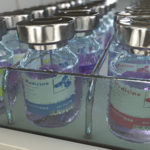 H. Lundbeck A/S has announced that Vyepti™ (eptinezumab-jjmr) was approved by the U.S. Food and Drug Administration for the preventive treatment of migraine in adults and will be available in April 2020. The recommended dosage is 100 mg as an intravenous infusion over approximately 30 minutes every 3 months; some patients may benefit from a dosage of 300 mg. Lundbeck expects to submit eptinezumab for approval to regulatory authorities in the European Union during 2020, followed by submissions for approval in other regions. Development of eptinezumab was initiated by Alder BioPharmaceuticals, Inc., which was acquired by Lundbeck in October 2019.
H. Lundbeck A/S has announced that Vyepti™ (eptinezumab-jjmr) was approved by the U.S. Food and Drug Administration for the preventive treatment of migraine in adults and will be available in April 2020. The recommended dosage is 100 mg as an intravenous infusion over approximately 30 minutes every 3 months; some patients may benefit from a dosage of 300 mg. Lundbeck expects to submit eptinezumab for approval to regulatory authorities in the European Union during 2020, followed by submissions for approval in other regions. Development of eptinezumab was initiated by Alder BioPharmaceuticals, Inc., which was acquired by Lundbeck in October 2019.
Eptinezumab-jjmr is a humanized immunoglobulin G1 (IgG1) monoclonal antibody specific for calcitonin gene-related peptide (CGRP) ligand. It is produced in Pichia pastoris yeast cells by recombinant DNA technology. The safety of VYEPTI was evaluated in over 2000 patients with migraine who received at least one dose of the drug. The approval was supported by positive results from the PROMISE 1 (NCT02559895) and PROMISE 2 (NCT02974153) Phase 3 clinical trials, which investigated eptinezumab for episodic and chronic migraine prevention, respectively. In PROMISE-1, a total of 665 patients were randomized to receive placebo (N=222), 100 mg Vyepti (N=221), or 300 mg Vyepti (N=222) every 3 months for 12 months. Mean migraine frequency at baseline was approximately 8.6 migraine days per month and was similar across treatment groups; mean change from baseline in monthly migraine days (MMD) with Vyepti compared with placebo months 1-3 was -3.9 days for 100 mg (p=0.018), -4.3 days for 300 mg (p<0.001), and -3.2 days for placebo. In PROMISE-2, a total of 1,072 patients were randomized to receive placebo (N=366), 100 mg Vyepti (N=356) or 300 mg Vyepti (N=350) every 3 months for 6 months. Mean migraine frequency at baseline was approximately 16.1 migraine days per month and was similar across treatment groups. Mean change from baseline in MMD compared with placebo months 1-3 was -7.7 days for 100 mg (p<0.001), -8.2 days for 300 mg (p<0.001), and -5.6 days for placebo
The Antibody Society maintains a comprehensive table of approved monoclonal antibody therapeutics and those in regulatory review in the EU or US. The table, which is located in the Web Resources section of the Society’s website, can be downloaded in Excel format. Information about other antibody therapeutics that may enter regulatory review in 2020 can be found in ‘Antibodies to watch in 2020’.



